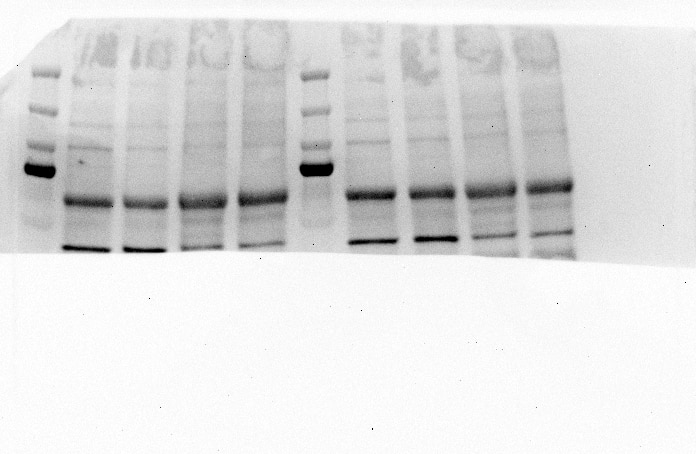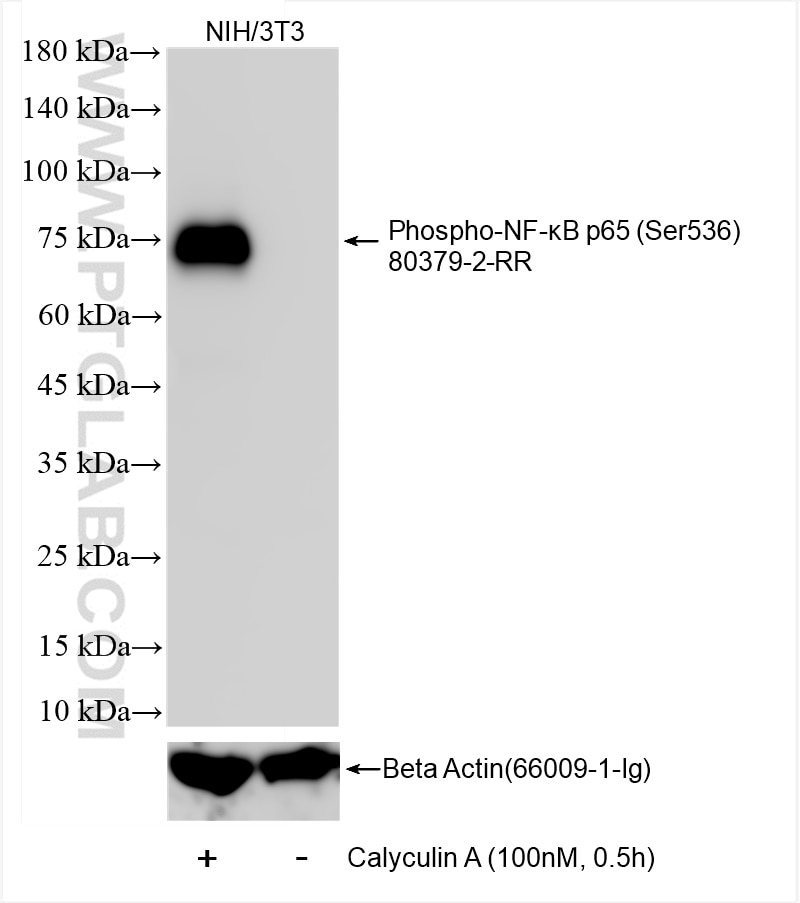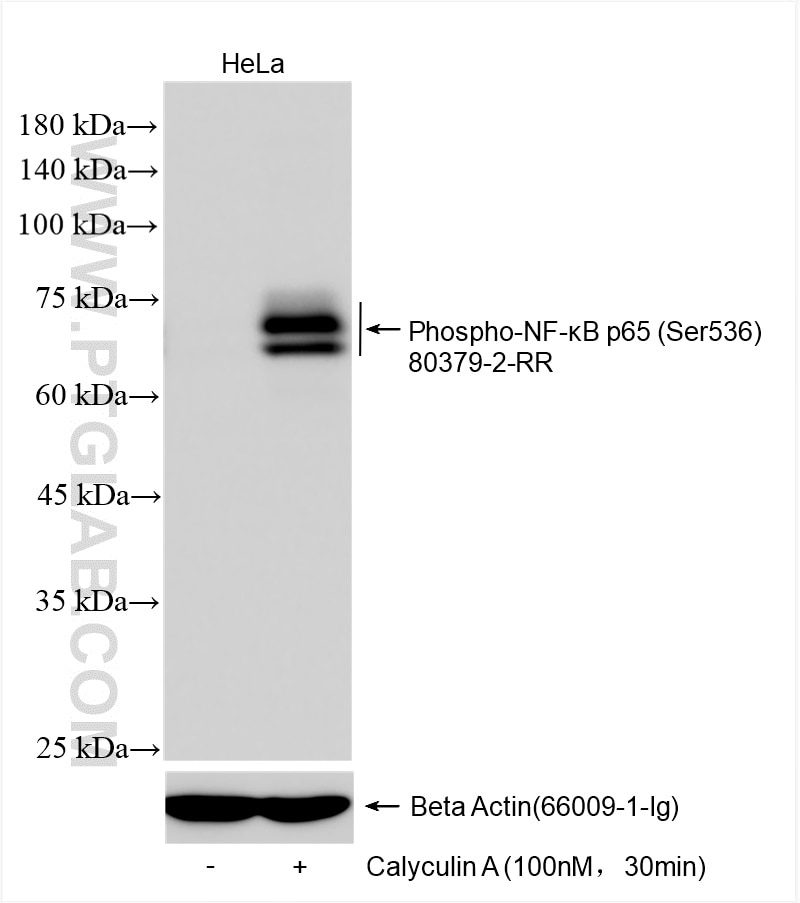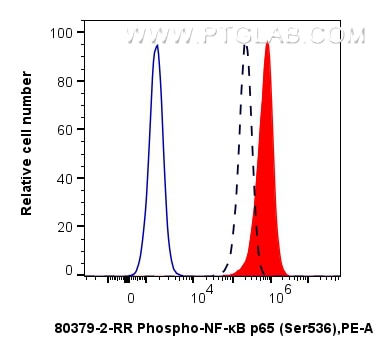Anticorps Recombinant de lapin anti-Phospho-NF-κB p65 (Ser536)
Phospho-NF-κB p65 (Ser536) Recombinant Antibody for WB, FC (Intra), ELISA
Hôte / Isotype
Lapin / IgG
Réactivité testée
Humain, souris et plus (1)
Applications
WB, FC (Intra), ELISA
Conjugaison
Non conjugué
CloneNo.
240777D9
N° de cat : 80379-2-RR
Synonymes
Galerie de données de validation
Applications testées
| Résultats positifs en WB | cellules NIH/3T3 traitées à la calyculine A, cellules HeLa traitées à la calyculine A |
| Résultats positifs en FC (Intra) | cellules PC-3, |
Dilution recommandée
| Application | Dilution |
|---|---|
| Western Blot (WB) | WB : 1:2000-1:10000 |
| Flow Cytometry (FC) (INTRA) | FC (INTRA) : 0.25 ug per 10^6 cells in a 100 µl suspension |
| It is recommended that this reagent should be titrated in each testing system to obtain optimal results. | |
| Sample-dependent, check data in validation data gallery | |
Applications publiées
| WB | See 17 publications below |
Informations sur le produit
80379-2-RR cible Phospho-NF-κB p65 (Ser536) dans les applications de WB, FC (Intra), ELISA et montre une réactivité avec des échantillons Humain, souris
| Réactivité | Humain, souris |
| Réactivité citée | rat, Humain, souris |
| Hôte / Isotype | Lapin / IgG |
| Clonalité | Recombinant |
| Type | Anticorps |
| Immunogène | Peptide |
| Nom complet | v-rel reticuloendotheliosis viral oncogene homolog A (avian) |
| Masse moléculaire calculée | 65 kDa |
| Poids moléculaire observé | 75 kDa |
| Numéro d’acquisition GenBank | BC011603 |
| Symbole du gène | NF-κB p65 |
| Identification du gène (NCBI) | 5970 |
| Conjugaison | Non conjugué |
| Forme | Liquide |
| Méthode de purification | Protein A purfication |
| Tampon de stockage | PBS with 0.02% sodium azide and 50% glycerol |
| Conditions de stockage | Stocker à -20°C. Stable pendant un an après l'expédition. L'aliquotage n'est pas nécessaire pour le stockage à -20oC Les 20ul contiennent 0,1% de BSA. |
Informations générales
Nuclear factor kB (NF-kB) is a collective term for a small family of dimeric transcription factors [comprising p65 (RelA) and RelB, c-Rel, p50/p105 (NF-κB1), and p52/p100 (NF-κB2)]. All NF-κB proteins share a Rel homology domain (RHD), which is responsible for DNA binding and dimerization. Only p65, RelB, and c-Rel contain potent transactivation domains within sequences from the C-terminal to the RHD. Exterior signals lead to the phosphorylation and degradation of the inhibitory complex IκB, which is modulated by the IκB kinase (IKK), and its degradation allows for the release of the typical NF-κB heterodimer, p65/p50, to translocate into the nucleus. NF-κB binds to its cognate DNA elements and can transcriptionally activate different target genes among which 200-500 genes have been implicated in cell survival/apoptosis, cell growth, immune response, and inflammation.
Protocole
| Product Specific Protocols | |
|---|---|
| WB protocol for Phospho-NF-κB p65 (Ser536) antibody 80379-2-RR | Download protocol |
| Standard Protocols | |
|---|---|
| Click here to view our Standard Protocols |
Publications
| Species | Application | Title |
|---|---|---|
Int J Nanomedicine Unexpected Inhibitory Role of Silica Nanoparticles on Lung Cancer Development by Promoting M1 Polarization of Macrophages | ||
Front Immunol SQLE-mediated squalene metabolism promotes tumor immune evasion in pancreatic cancer | ||
J Ethnopharmacol Proteomic analysis reveals that Acalypha australis L. mitigates chronic colitis by modulating the FABP4/PPARγ/NF-κB signaling pathway | ||
Cell Death Discov 17β-estradiol alleviated ferroptotic neuroinflammation by suppressing ATF4 in mouse model of Parkinson's disease | ||
Adv Mater Suppression of Sepsis Cytokine Storm by Escherichia Coli Cell Wall-Derived Carbon Dots | ||
Clin Exp Pharmacol Physiol Inhibition of DNA Methyltransferase DNMT1 Reverses Th2 Response Polarisation and Alleviates Allergic Rhinitis |
Avis
The reviews below have been submitted by verified Proteintech customers who received an incentive for providing their feedback.
FH Ana (Verified Customer) (07-10-2025) | No issues at all. Diluted it in 3% BSA in Tween 1%/PBS and detection was clear
 |




